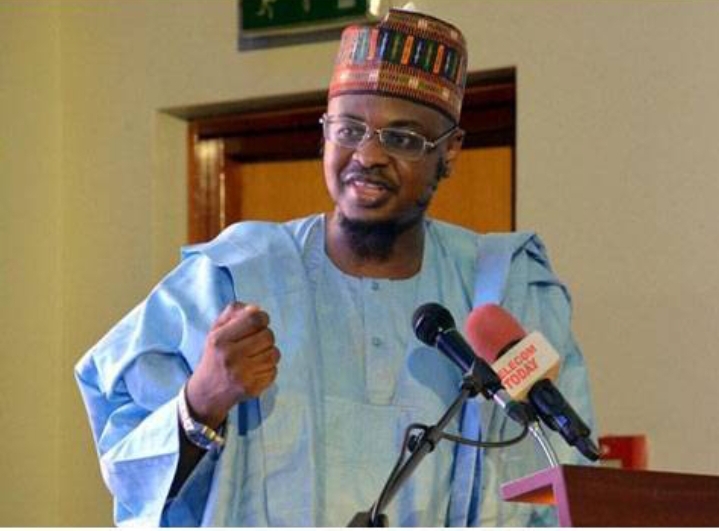News
Pantami lashes out, forbids the importation of certain telecommunications equipment

Ibekimi Oriamaja reports
When it comes to enforcing the ban on certain telecom equipment that can be manufactured in Nigeria, Prof Isa Pantami, Minister of Communications and Digital Economy, and his counterpart at the NCC, Prof Umar Danbatta, are on the same page.
Pantami was visibly enraged on Monday at the inaugural Nigerian Telecommunications Indigenous Content Expo, NTICE, organized by the Nigeria Office for Developing Indigenous Telecoms Sector, NODITS, given the high percentage of telecom equipment imports.
He lamented the fact that imports are made even when some of the equipment is available locally.
“From now on, the Federal government will not tolerate the importation of anything into the country when we have the capacity to produce it,” the minister said in a directive to all stakeholders. Indeed, let me state unequivocally that the importation of SIM cards, for example, will no longer be tolerated by the federal government. We are now producing them in Nigeria.
“Our goal is to increase indigenous content in the ICT sector so that we are at least 80% self-sufficient by 2025.” We urge stakeholders and citizens to help the government increase local consumption and patronage. History will be kind to all of us if we follow through on this.
“The Nigerian Communications Commission, NCC, and the National Office for the Promotion of Indigenous Content, NODIT, should enforce this policy,” he added.
In June, Pantami announced the opening of a SIM card manufacturing plant in Lagos.
The private-sector-funded facility has the capacity to produce 200 million cards per year and export them to other African countries.
In support of his minister, NCC Executive Vice Chairman Prof Umar Danbatta stated that on March 8, 2021, President Muhammadu Buhari signed the “National Policy for the Promotion of Indigenous Content in the Nigerian Telecommunications Sector.”
The Policy focuses on four areas: manufacturing, telecommunications services and software, people, and research and development for digital innovation and entrepreneurship.
It also proposes the formation of the Nigeria Office for the Development of the Indigenous Telecommunications Sector (NODITS), a Special Purpose Vehicle housed within the Commission.
The establishment of NODITS to drive the provision of indigenous content for the telecom industry is not only appropriate, but also in accordance with the Nigerian Communications Act 2003, Section 1, sub-sections (d) and (e) “Encourage local and foreign investments in the Nigerian communications industry, as well as the introduction of innovative services and practices in accordance with international best practices and trends.”
As a result, the goal of this Policy is to translate the telecom industry’s tremendous strides over the last two decades into long-term indigenous economic development outcomes for Nigerian companies and citizens through capacity building, institutional building, and strategic policy tools that will promote domestic and economic linkages, job creation, and local Small and Medium Scale Enterprises (SMEs) participation in the telecom value chain.
Danbatta previously stated at a Lagos event that his Commission had identified 72 action points to promote indigenous content in the telecommunications sector.
He went on to say that the commission had gathered at least 30 stakeholders for a round table discussion on how to implement the Policy effectively.
According to him, ongoing discussions have included Ministries, Departments, and Agencies (MDAs), Mobile Network Operators (MNOs), SIM card manufacturers, tower and mast manufacturers, and Original Equipment Manufacturers (OEMs) (OEMs).
“At a higher level, the Commission had identified some time-based metrics for NPPIC, categorizing them as immediate, short-term, medium-term, and long-term. These include activities such as the formation of a local content steering committee, engagement with relevant internal and external stakeholders, and the commissioning of baseline studies on the level of indigenous content in the Nigerian telecoms industry.”
Others, he claims, include the development of regulations, the monitoring and enforcement of Key Performance Indicators (KPIs) and methodologies, the development of implementation guidelines, and ongoing efforts in R&D, as well as monitoring, evaluation, and enforcement.
To achieve its objectives, the NPPIC, according to Danbatta, must take more focused and direct actions than in the past.
“In order to ensure the NPPIC’s effective implementation, we have articulated several Specific, Measurable, Attainable, Relevant, and Time-bound targets and high impact interventions” (SMART).
“As a result,” he said, “we will rely on the efforts of industry stakeholders, watchdogs, and partners to develop independent metrics that will ensure the NPPIC’s goals are met.”
He also stated that the Commission is already implementing some of the 72 action points and plans through NODITS, with some results.
“For example, the Federal Government may capture some of the target areas for gazette, and companies providing such goods and services may be granted pioneer industry status by the Nigerian Investment Promotion Commission.”
“Another achievement is the Nigerian Export Promotion Council’s (NEPC) recognition of telecommunications services as an exportable nontangible asset, which resulted in promotion and funding,” he added.
“Another achievement is the Nigerian Export Promotion Council’s (NEPC) recognition of telecommunications services as an exportable nontangible asset, which resulted in promotion and funding,” he added.
According to him, the Commission “is also promoting the establishment of a manufacturing facility for Corrugated Optical Duct (COD) in Nigeria, which will complement Coleman Technical Industries’ recent launch of the first optic fibre cable (OFC) manufacturing plant in collaboration with Corning, a world-renowned leader in OFC development and manufacturing.”
He stated that while skilled manpower, funding, and software development are all being prioritized, a different set of metrics such as skill areas, available personnel, skill migration, and new skill development will be required, for which the industry will be a key driver and source of statistics.
“Our discussions with the Digital Bridge Institute (DBI) and some of the MNOs, TowerCos, and OEMs are focused on skills development as well as telecoms equipment repair and maintenance, both of which are critical components for the telecoms industry’s indigenous emancipation,” he explained.
-

 News4 days ago
News4 days agoYahaya Bello: American International School Of Abuja Has Transferred $760,910.84 To EFCC Out Of $845,852
-

 Politics6 days ago
Politics6 days agoONDO 2024/ Akeredolu’s ex-deputy Agboola wins PDP governorship election primary.
-

 Politics4 days ago
Politics4 days agoKogi: I didn’t pay $720,000 as school fees – Yahaya Bello
-

 Politics4 days ago
Politics4 days agoOndo Guber: PDP ‘ll win November election — Jegede
-

 News4 days ago
News4 days agoWhy people do strange, incredible things for love – Psychologist
-

 Business5 days ago
Business5 days agoCustoms Area 1 Ph Hits N43 Billion Revenue Generation in first Quarter of 2024
-

 Sports5 days ago
Sports5 days agoVictor Boniface: Leverkusen boss Alonso makes you ‘up your game’
-

 Entertainment4 days ago
Entertainment4 days agoDavido on earning $1.3 million after NY performance




